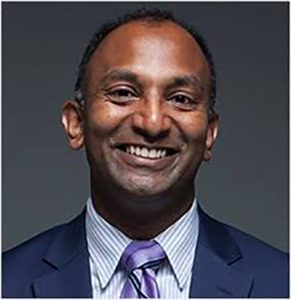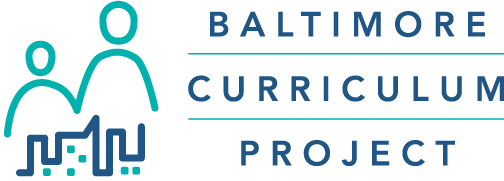 Thiru Vignarajah, a former federal and city prosecutor, Deputy Attorney General of Maryland, and litigation partner at DLA Piper, joined the Baltimore Curriculum Project (BCP) Board of Trustees 15 years ago. He recently shared with BCP why helping to shepherd Baltimore City public education through BCP resonates so deeply with him.
Thiru Vignarajah, a former federal and city prosecutor, Deputy Attorney General of Maryland, and litigation partner at DLA Piper, joined the Baltimore Curriculum Project (BCP) Board of Trustees 15 years ago. He recently shared with BCP why helping to shepherd Baltimore City public education through BCP resonates so deeply with him.
Q: Why is supporting public education in Baltimore through BCP board service so meaningful to you?
A: I am the son of Baltimore City Public School teachers and a product of public schools myself. For so much in life I am indebted to public education. My mom started her career teaching math at Poly in 1970 and finished her career teaching at Morgan State after getting her PhD at the age of 62. My father was a math and science teacher at Edmondson High School, Frederick Douglass, Southern before and after it became Digital Harbor, and finished his career at Western High School. When he retired from Western, he was 80 years old and the oldest teacher teaching in Maryland. They both still miss teaching, but they have a few grandkids to teach now. Between my parents’ devotion to teaching and public schools, I had the chance to go from Edmondson Heights Elementary and Woodlawn High School to Yale University and Harvard Law School. None of that is possible without the power of public education.
Q: How did you learn about BCP and get involved on the board?
A: When I returned to Baltimore after law school, I was clerking at the Supreme Court for Justice Breyer and commuting to Washington, D.C. Even then, I was looking for opportunities to serve the community in a way that helped to solve the problems before they started. I began my career in Baltimore as a federal prosecutor, but it always struck me that prosecutors get involved when things have gone wrong. When someone commits some horrific crime, it is partly because the institutions of school and family have failed, the promise of economic opportunity and stable housing have not been delivered. All of that is tied to education.
So I was looking for ways to serve the community as my parents did: upstream, at the start of the river. At the time, I was teaching a class on law and education at the University of Maryland Law School. From an academic perspective, I learned that charter schools can be hit and miss. Some have terrific outcomes and strong visions and leadership models. Some shutter a couple of years after they start.
It was around then that I learned about BCP, its specific vision with proven outcomes at a variety of different schools, especially with its anchor principle of community charter schools. I got excited to learn more and was ultimately invited to serve on the board, which has been a great honor.
Q: How is your service on the BCP board different from your other civic work?
Mark Twain has a famous saying: ‘The two most important days of your life are the day you were born and the day you find out why.’ I don’t know that when I was growing up here, or even when I was in college and law school, that I would have told you that my calling would be to come back and serve my hometown. But at some point, it became clear that that was.
Deep in my heart, I feel the reason I was put on this earth was to do some good in this city that did so much for my family. In many ways, I have tried to live that pledge through my work as a prosecutor, attorney, public servant, and member of nonprofit boards that serve Baltimore.
Serving on the BCP board that helps support public charter schools in a city whose education system has so many challenges feels so different. Frederick Douglass once said that “It is easier to build strong children than to repair broken men.” Public schools at their best are charged with doing exactly that: building strong children.
Q: Why do you feel BCP’s community school model is so important, especially with BCP schools located in neighborhoods in need?
A: One of the critiques of charter schools, which I first learned from an academic perspective, is that they often pluck from a struggling city the most motivated kids and the most motivated families, and they bring them to one place. As a result, they are kind of sapping the most talented students and most engaged families from each of their respective neighborhoods.
BCP has proven that you don’t have to do that to have a strong, successful school. BCP serves the neighborhood children first, then expands beyond. Our community schools build on the nucleus of the community that is already there and certainly invite others in, but they’re not excluding the kids that already call this community home. I think that is just a brilliant model and such a powerful rebuttal to one of the most fair concerns with public charter schools.
Q: You ran for Mayor and State’s Attorney for Baltimore. What’s your vision for Baltimore and what is it gonna take for all of us to reach that vision?
My campaigns fell short, but I am continuing to honor my pledge that I would fight for the people of Baltimore and beyond. I don’t know that there’s another city in this country that has a bigger distance between where we are and where we could be. Our city has limitless potential that is just waiting to be unleashed.
We’ve got the westernmost deepwater port on the Eastern Seaboard, one of the most convenient international airports, great hospitals and educational institutions, legendary sports franchises, a rich civic and cultural history, and a location between the political and financial capitals of the world. We have assets that are the envy of cities across the nation yet, tragically, we have found a way to squander a lot of them.
What we need to unleash this untapped potential is leadership, a vision for what the city could be and a roadmap to get there. I don’t think it’s just about having this kind of aspirational, abstract idea of what the city could be. I think it’s really important for a leader to set that forth, to explain what our city can be, um, and to share a concrete blueprint for how you rebuild our schools, revitalize the economy, and turn the tide on crime. You have to go back to the days of William Donald Schafer and Kurt Schmoke for our last clear vision and a concrete road map. Baltimore has so much going for it. I think the tragedy of Baltimore is that it is just waiting to unveil its true promise.
Thank you, Thiru, for your service to BCP and Baltimore.
About Thiru Vignarajah
- Managing Partner, Law Offices of Thiru Vignarajah, founded July 2024
- Managing Partner, Sanford Heilsler Sharp, 2023-24
- CEO, Capital Plus Financial
- Litigation Partner, DLA Piper
- Deputy Attorney General of Maryland
- Division Chief, Major Investigations Unity, Office of the State’s Attorney for Baltimore City
- Assistant U.S. Attorney, District of Maryland
- Adjunct Faculty and Lecturer in constitutional law and crime policy, Johns Hopkins University, University of Maryland School of Law, and University of Baltimore Law School
Education:
- J.D., Harvard Law School, magna cum laude
- Harvard Law Review President, Volume 118
- M.A., Medical Law & Ethics, Highest Honors
- B.A., Philosophy, B.A., Political Science, Yale University
Civic Service:
Through his pro bono work, scored a number of notable victories for neglected groups and individuals. He is on the boards of:
- Baltimore Curriculum Project
- Citizenship Law Related Education Program (MYLAW)
- Strong City Baltimore
- Maryland Film Festival
